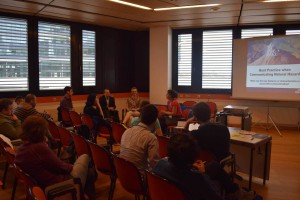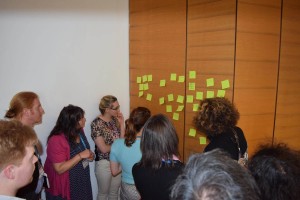Education empowers communities and enables effective accountability between individuals, scientists, government, business and the charity sector. Geo-education is no exception, and while natural hazards education is only one area of this, it demonstrates well the importance of knowledge exchange. In this first blog, from the EGU Press Office, I explore this theme further, reflecting on the role of organisations such as EGU in equipping geoscientists to educate and reporting back on a session yesterday on natural hazards education and communication.
—
What are the warning signs that a slope may be about to fail? Why should a community water project be at a certain distance from a latrine, and what distance? When is the best time to conduct a survey for a new water project? What are the possible environmental dangers and economic opportunities of a new nickel mining project?
As geologists it’s easy to take for granted the understanding we develop over our training and careers. Most of us could give reasonable, accurate and comprehensive answers to the above questions without much thought. For others, however, a lack of opportunities for education, for discussion, for mutual knowledge exchange means they can’t.
Imagine… The consequences of an emergency settlement being built in a valley highly susceptible to debris flows. A water source offering ‘clean-water’ to a community for the first time being build next to a latrine, meaning the water is as dangerous as it was before. A survey for a water project being done at the end of rainy season, and the project failing when dry season arrives. Exploration in a region known to have nickel, and communities only having rumours to base their opinion, monitoring and ability to hold the company to account.
All of the above examples are things I’ve witnessed and discussed with people over the past few years. They resulted in decisions being made that had to be rectified, at high expense. They generated emotions of fear and frustration. Sickness, lost income, and lost education were all characteristics of failed water projects. Tragically, there is a high chance that death was also triggered by this lack of understanding. Similar decisions and consequences can be seen in the geoscience community also, where the lack of understanding is with regards social science, communication skills or engagement of stakeholder groups.
Scientia potentia est
The phrase ‘knowledge is power’ has been around for hundreds of years. When people expand their understanding, they are empowered to make balanced, well informed decisions that can transform their own lives that their communities. They can hold governments, industry, NGOs to account. When industries, NGOs and Governments expand their understanding, they can make better decisions, better serve in-country communities. When we as geologists expand our understanding – we can do our jobs better, integrating relevant socio-economic or cultural information to better manage work or research we undertake overseas.
There is a long and wide literature on different aspects of education, the importance of all stakeholders coming as equals, having information to contribute and co-generating new knowledge through research, discussions and other tools. Put simply, however, each individual has much to learn and much to share. Whether we choose to share the information we have with those who want to and need to understand it, depends on factors ranging from time, altruism, opportunities to engage, and confidence to share. When people are at risk of losing their livelihood, access to education, health or even lives, due to lack of geoscience understanding – we must carefully assess what we can do to maximise sharing, dissemination and discussion of our geoscience knowledge and research.
Equipping to Educate Effectively
If we are to see an increase in ‘global geoscience literacy’ – the ability of the general public to understand and use geoscience information – we need geoscientists who are equipped to educate effectively. The power of social media, the ability to engage people around the world at relatively low cost, the importance of developing sustainable education programmes and the high value of investing in educating women and children must be recognised. Culture changes are required in the training of young geoscientists at college, graduate and doctoral level. Universities must recognise that education and public outreach is not a sign of a failing research career, but a strong commitment to their subject and its impact on society. Professional and scientific organisations, such as the EGU, must take these topics as seriously as advances in scientific research. The wide array of communications, outreach and open-access sessions at the EGU General Assembly this year demonstrates an admirable commitment to this cause. These sessions are often well attended, with lively and informative debate. They are starting to ‘mainstream’ these conversations, moving them from a specialist niche to the attention of the wider community.
Natural hazards education, communications and the science-policy-practice interface
Yesterday afternoon, there was a well-attended session focused on natural hazards education, communications and the science-policy-practice interface, with some innovative abstracts sharing lessons learnt and a discussion on best practice. Perspectives offered in this session came from a range of international experiences – with board games to strengthen resilience in Africa, teacher training across Central Asia to encourage teaching on earthquakes, exciting ways to assess perceptions of hazards in the Caribbean and a number of examples from Europe. Perspectives were also offered by a range of generations, with the youngest participants being two high-school students from Italy. These students were working alongside the CNR-IRPI (Italy) on the development of software to help students understand hydrological hazards. Finally, it was a session that brought together physical and social scientists to share their perspectives.

Discussion participants turn to evaluating communications, and how responsive natural hazards scientists are to feedback that may suggest they need to change their approach
Many of the tools presented had two aims – knowledge transfer knowledge and discussion generation, simple interactive methods to promote a two-way dialogue about their experiences and understanding of natural hazards. The work of Mossoux et al (presented by Matthieu Kervyn), on the KAZAN board game for teaching natural hazards discussed this approach, as did Solmaz Mohadjer, talking about the work Parsquake undertakes on earthquake education in Central Asia. Solmaz spoke of the need to ‘fill the gap between fatalism and action by talking’. Dialogue builds knowledge which in turn empowers people to take positive actions.

Discussion participants think about things that hinder good communication, grouping them into core themes.
This was a message reinforced in a later discussion session, where participants shared their thoughts on positives and negatives when thinking about best practice in communicating natural hazards. The importance of (i) knowing your audience, not just in a superficial way, and (ii) recognising that it can take time to establish and build strong communication relationships, came across clearly.
—-
Events such as the EGU General Assembly play an important role in enabling discussions on topics such as education and communication. While ultimately individuals must understand the relationship between education and empowerment, and proactively choose to engage in such work – it’s a sign of a positive change in the culture of geoscience research and training that so much time is devoted at the EGU General Assembly to kick-starting important conversations and inspiring individuals with a passion for effective education.
